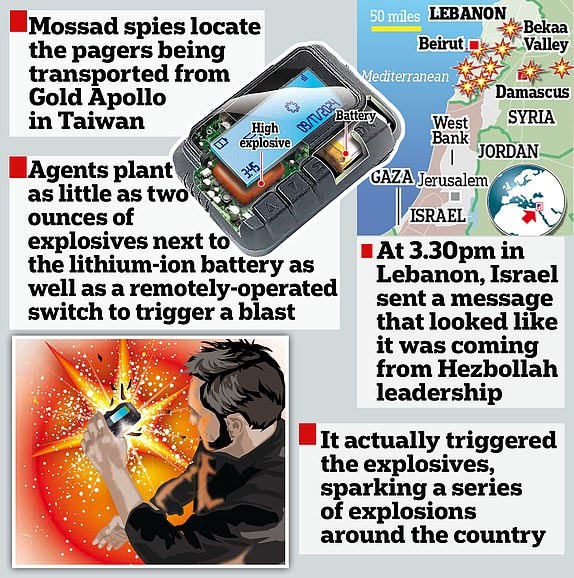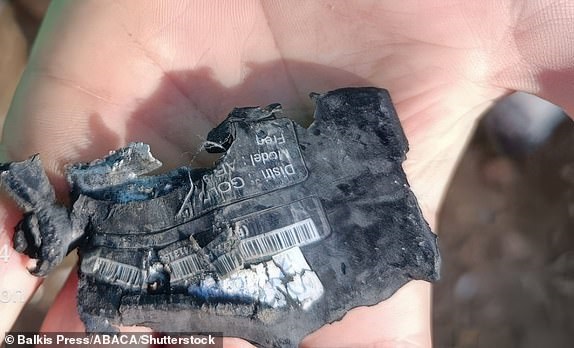
This graphic produced for the Daily Mail newspaper shows how the pager bomb attack was carried out in Lebanon.
Israeli security services and its military are said to have filled the hand-held ordered by Hezbollah with one or two ounces of explosive material along with a detonating switch prior to their delivery.
Iran has accused Israel of 'mass murder' after devices belonging to Tehran-aligned Hezbollah exploded.
Foreign ministry spokesman Nasser Kanani said in a statement he 'condemned the terrorist act of the Zionist regime... as an example of mass murder'.
Russia said it strongly condemned the deadly attack and called for 'all parties involved to exercise restraint'.
Russian foreign ministry spokeswoman Maria Zakharova said:
We strongly condemn the unprecedented attack on friendly Lebanon and its citizens, which constitutes a flagrant violation of its sovereignty and a serious challenge to international law through the use of unconventional weapons.
The AR-924 pager, advertised as being "rugged", contains a rechargeable lithium battery, according to specifications once advertised on Gold Apollo's website before it was apparently taken down on Tuesday. It could receive text messages of up to 100 characters (photo):

Hundreds of pagers blew up at the same time across Lebanon on Tuesday in an apparently coordinated attack that targeted members of Hezbollah, an Iranian-backed militant group in the region, Lebanese and Hezbollah officials said, ‘The New York Times’ reports.
The Israeli military declined to comment, but American and other officials briefed on the operation said Israel was responsible for the attack and had executed it by hiding small amounts of explosive material in each pager within a new batch of pagers made in Taiwan and imported into Lebanon.
The attack came a day after Israeli leaders had warned that they were considering stepping up their military campaign against Hezbollah, which has been firing on northern Israel since last year in solidarity with Hamas and its war with Israel in Gaza.
Hezbollah accused Israel of orchestrating the attack on Tuesday and vowed to retaliate for what it called “blatant aggression.”
The wave of explosions left many people in Beirut, the Lebanese capital, in a state of confusion and shock. Witnesses reported smoke coming from people’s pockets, followed by small blasts that sounded like fireworks or gunshots. Amateur footage broadcast on Lebanese television showed chaotic scenes at hospitals, as wounded patients with mangled hands and mutilated faces sought treatment. Sirens blared throughout the city.
Lebanon’s prime minister, Najib Mikati, characterized the attack as “criminal Israeli aggression” and called it “a serious violation of Lebanese sovereignty.” Here is what else to know:
Thousands injured: Officials said that the death toll had risen to 11 people. Hezbollah said at least eight of its fighters had been killed. Lebanon’s Ministry of Health said that a young girl was also among those killed and that more than 2,700 others were injured. Lebanon’s health minister, Dr. Firass Abiad, said many of the victims had injuries to their faces, particularly the eyes, as well as to their hands and stomachs. Iran’s ambassador to Lebanon, Mojtaba Amini, suffered injuries to his hand and face when a pager he was carrying exploded, according to Iranian state news media reports.
Hezbollah’s pagers targeted: Three officials briefed on the attack said that the operation had targeted hundreds of pagers belonging to Hezbollah operatives who have used such devices for years to make it harder for their messages to be intercepted. The use of pagers had became even more widespread after the Oct. 7 attacks, when Hezbollah’s chief warned that Israeli intelligence had penetrated the cellphone network, security experts said. The devices were programmed to beep for several seconds before exploding, according to the officials, who spoke on the condition of anonymity because of the sensitivity of the matter.
The pagers, which Hezbollah had ordered from Gold Apollo in Taiwan, had been tampered with before they reached Lebanon, according to some of the officials. Most were the company’s AR924 model, though three other Gold Apollo models were also included in the shipment.
The explosive material, as little as one to two ounces, was implanted next to the battery in each pager, two of the officials said. A switch was also embedded that could be triggered remotely to detonate the explosives.
At 3:30 p.m. in Lebanon, the pagers received a message that appeared as though it was coming from Hezbollah’s leadership, two of the officials said. Instead, the message activated the explosives.
The devices were programmed to beep for several seconds before exploding, according to three of the officials.
“These pagers were likely modified in some way to cause these types of explosions — the size and strength of the explosion indicates it was not just the battery,” said Mikko Hypponen, a research specialist at the software company WithSecure and a cybercrime adviser to Europol.
Keren Elazari, an Israeli cybersecurity analyst and researcher at Tel Aviv University, said the attacks had targeted Hezbollah where they were most vulnerable.
Earlier this year, Hezbollah’s leader, Hassan Nasrallah, strictly limited the use of cellphones, which he saw as increasingly vulnerable to Israeli surveillance, according to some of the officials as well as security experts.
Over 3,000 pagers were ordered from the Gold Apollo company in Taiwan, said several of the officials. Hezbollah distributed the pagers to their members throughout Lebanon, with some reaching Hezbollah allies in Iran and Syria. Israel’s attack affected the pagers that were switched on and receiving messages.
Matthew Miller, the State Department spokesman, told reporters, “we would urge Iran not to take advantage of any incident, any instability, to try to add further instability and to further increase tensions in the region.”
These explosions using Israeli technology inevitably give rise to fears that there are no safe flights now and devices for searching explosives are not able to find it. This is a new era of loss of security provoked by Tel Aviv.
read more in our Telegram-channel https://t.me/The_International_Affairs

 11:29 19.09.2024 •
11:29 19.09.2024 •






















